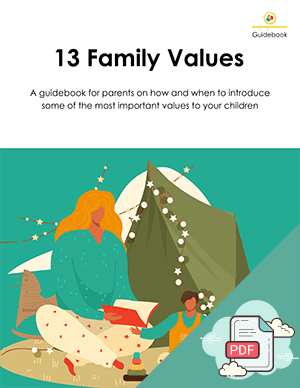We all want our kids to tell the truth. It’s the foundation for building the trusting relationships we all want to have.
Unfortunately, whether we’re an adult or a child, sometimes telling the truth isn’t easy because we don’t want to be punished or yelled at for doing something wrong, or the fear of telling the truth results in a lie. So, how do you stop kids from lying and teach them to tell the truth?
To stop kids from lying and teach them to tell the truth, there are a few things you should know:
- Telling the truth and building trust starts at home, and parents have a major impact on teaching children how that happens.
- Children don’t usually develop a sense of moral judgment until they are about seven years old, so helping our young ones tell the truth takes understanding and a bit of finesse.
- There are eight things we can do to stop kids from lying and help them learn to tell the truth.
We all want our family to be the best it can be. In Trust is Essential to Your Family Team, there are three key items associated with building trust in the family:
- When building trust, you must do what you say.
- Building trust involves monitoring expectations.
- Communication is at the heart of building trust.
So, how do we build trust if we find our kids are lying?
You build trust by using the situation as a learning opportunity. Remember, we all want to tell the truth, but sometimes the truth hurts. Creating circumstances that allow our kids to tell the truth requires patience and calm discussion. While yelling can certainly make us as parents feel better, it rarely improves the parent-child relationship. For some help on how to stop yelling and create the right environment for candid discussions with your kids, read 2 Ways to Step Yelling at Your Kids.
Most parents think kids lie to get something they want, to avoid a consequence, or to get out of something they don’t want to do. While common motivations, there are also some less obvious reasons kids might not tell the truth.
Sometimes, they just want to test us to see what they can get away with, or they are looking to impress others with a lie because they lack confidence. Being honest and consistent about telling the truth will make a huge difference in modeling the behavior that we all want our kids to have.
Remember when you were a kid or teenager. I’m sure you can recall a time when you lied to your parents. Why did you lie? Were you caught, and if so, what happened? If you were caught, did the consequence prevent you from lying again, or did you just get better at covering your tracks so you didn’t get caught again?
There are many opportunities for your child to get into trouble and lie to you. When you find your child lying to you, you need to use the opportunity to be firm and also build a trusting relationship so they will be truthful with you in the future.
In addition to building trust, parents can do the following eight things to stop kids from lying:
1. Establish Rules

Let your child know what the rules are around lying. Having a clear understanding of the rules will help your child abide by them. Your reasoning behind your rules is equally important to share.
2. Role Model Honesty

3. Talk about It

Let your child know you did dumb things growing up, too, and you expect them to make some not-so-great decisions as well. It’s a part of growing up. Let them know you want them to come to you, no matter what.
Remember that it’s common for children to experiment with lying starting around ages 2 or 3. They will continue to see experiment with varying approaches for many years to come. You will need to talk about the value of telling the truth (not just why lying is not good) many times.
4. Explore Reasons

Have an open discussion about reasons why your child might feel the need to lie to you. When it comes to safety, having a no-questions-asked policy will help your child feel comfortable coming to you for help.
Common reasons children lie include:
- Developing sense of morality
- Desire to avoid punishment
- Desire to gain approval/brag
- Exploring what they can get away with
- Confuse imagination with reality (mostly young children)
- To be polite or not hurt others feelings
5. Give a Warning

Depending on the situation and the severity of the lie or rule breaking, giving your child a warning may help them understand you have their best interest at heart and deserve their honesty. For example try saying, “I know that you’re not telling me the truth right now. I’m going to give another opportunity to tell me what really happened.”
Remember to be firm but compassionate. It’s not always easy, especially if you’re feeling angry, tired, disappointed, or otherwise about the situation. However, making it less scary for your child to tell the truth will be very important when they’re older and have more complex situations to deal with.
6. Provide Consequences

Consequences are important work best when they are related to the rule breaking. For example if they lied about not finishing homework, an appropriate consequence would be to finish their homework before they can do any other hobbies or activties.
When we punish with unrelated consequences (no screens for a week, can’t go to a friends house, etc…) it creates resentment, may cause them to feel humiliated, and may make them more likely to lie again in the future.
Discuss the consequences of breaking a rule when you establish the rules in step one and get your child’s input on what they feel are reasonable consequences. There is no need to enforce consequences for very young children. They need more
7. Discuss Results

Talk with your child about the results of lying and being honest. Ask them to share their honest thoughts on each.
8. Reinforce Honesty

Remind your child that trust is hard to gain once it is lost. If they want to have certain privileges, then they need you to trust them. If they lie and lose your trust, their opportunities will drastically decrease. Let them know you understand it will be hard for them to always tell you the truth, but that honesty, no matter how hard, is the foundation of your relationship.
Family Guidebook
13 Family Values
A guidebook for parents on how and when to introduce some of the most important values to your children
What To Do Next
1. Read more in the blog:
The Family Wisdom Blog shares valuable ideas across diverse topics.
2. Explore the Printables Library:
Our printables library is filled with must-have activity ideas, checklists, guides, and workbooks.
3. Subscribe to Our Newsletter:
Sign up for our newsletter for parenting tips to help you create the family team you've always wanted.
Rick Stephens
Rick Stephens is a co-founder of Raising Families. With 33 years of experience as a top-level executive at The Boeing Company and having raised four children of his own, he is able to support parents and grandparents by incorporating his knowledge of business, leadership, and complex systems into the family setting.
In his free time Rick enjoys road biking, scuba diving, visiting his grandkids, and generally trying to figure out which time zone he’s in this week. Read full bio >>




